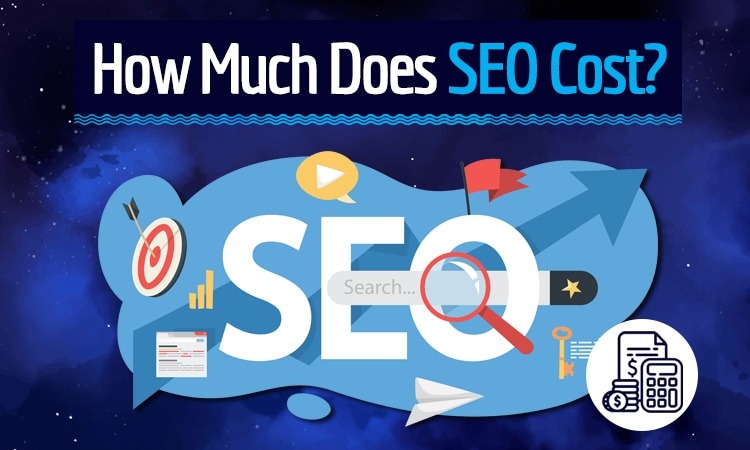Several articles dig into the overarching expenses of SEO. Although the payment to an SEO consultant or agency is a component of the overall cost of implementing SEO, achieving results necessitates a significant investment of time and effort from the business.
In this article, we will explore beyond the superficial aspects, providing insights into the comprehensive range of costs linked to executing effective SEO. This understanding will equip you to enter 2024 well-prepared for achieving success in SEO.

The Basics of SEO Costs
If you seek a simple overview of SEO expenses, several studies have addressed this query.
The precise costs vary based on factors such as business size, objectives, industry, geographical location, and the overall complexity of the project. However, as an average in 2023, the following figures are noted:
- Hourly rates: $75 to $100
- Project-based fees: $2,501 to $5,000
- Monthly retainers: $500 to $1,500
In the United States, the majority of small businesses using SEO allocate $500 or less per month for these services. Meanwhile, in the UK, most small business SEO budgets hover around £500 monthly.
The issue with standard SEO pricing
Regrettably, there’s a flaw in this pricing model concerning SEO. Improving your SEO involves a more intricate and nuanced process than simply purchasing traffic. Broad, high-level figures assume that SEO is a completely hands-off endeavour. You pay a consultant or agency a fixed sum per month, and you magically ascend to the top of search rankings. However, this fanciful scenario is far from reality, as effective SEO demands collaboration between the business and the SEO consultant.
Entering the hyper-competitive landscape of 2024, SEO faces challenges from search ads, established brands, and more assertive and advanced competitors. Success in this environment necessitates both insightful SEO guidance and substantial effort. Aligning with Google’s objectives is important, and fortunately, Google’s SEO philosophy centres around E-A-T: Expertise, Authoritativeness, and Trustworthiness.
Google prioritizes content from experienced and credible authority figures in respective industries. Recognizing that your SEO might not be the ultimate authority in your business, it’s essential to view them not as someone who does it all for you, but as a guide.
Rather than perceiving SEO as a one-time payment for a finished service, it’s more apt to consider SEO within the framework of the 3Ms model: Manpower, Money, and Minutes.
- Manpower represents the time you invest.
- Money accounts for how you remunerate for guidance and advice.
- Minutes reflect the time required to see results, a pivotal aspect in SEO considerations.
Is SEO the appropriate option at this moment?
In light of this, it’s important to assess whether SEO aligns with your current priorities. While SEO is influential, it frequently requires time to yield results. If your immediate objective is to generate new business today, initiating a conversation about SEO or PPC may be more expedient. To aid in this decision-making process, articulate your overarching marketing objectives clearly, employing a structured system such as SMART goals.
Subsequently, use a similar methodology when establishing your SEO goals, treating them as an integral component of your broader marketing objectives. By formulating SMART SEO goals and corresponding SEO Key Performance Indicators (KPIs), you establish a control system that keeps your marketing efforts precisely targeted on what is most significant.
You can also read: How to Choose the Right SEO Company for Your Business
The Pitfalls of Outsourcing SEO
A final cautionary note: SEO differs significantly from PPC. Google’s priority is showcasing the best websites at the forefront of the search engine. Unlike PPC, you can’t simply pay your way to the top with SEO. Adopting this mindset may lead you into the trap of outsourcing SEO excessively. This involves a constant quest for an agency claiming to possess the elusive secret to SEO success, where others have faltered.
It’s important to remember that no agency holds a unique relationship with Google, and there’s no hidden trick for sustained success in reaching the top of Google. Instead of relying on shortcuts, it’s essential to strategize, plan, and put in the necessary work.
What are the real costs of SEO?
SEO is a nuanced marketing strategy, and costs extend beyond a simple agency fee versus results equation. Engaging in organic search demands thorough analysis, insightful planning, strategic thinking, expert counsel, hands-on support, technical updates, and creative endeavours. The synergy between the SEO efforts and the business is paramount for optimal results.
Improving your SEO, a task worth undertaking, requires a realistic perspective and an acknowledgement that it won’t be a cakewalk. Success in SEO demands a commitment of both time and money, akin to a sacrificial offering on the altar of SEO endeavours. However, if your dedication is steadfast, the rewards can be substantial.
The most effective SEO emerges from the intersection of your business acumen and the agency’s SEO expertise. Collaborative efforts yield results that surpass what either party could achieve in isolation.
This brings us to a more comprehensive array of SEO costs, encompassing:
SEO outsourcing costs
Your primary SEO expenditure involves seeking professional guidance from a reputable and seasoned expert. As outlined earlier, this service typically ranges from $75 per hour to $500 monthly, contingent on factors like competition, complexity, and scope.
It’s essential to note that various types of SEO companies exist, offering a spectrum of services, including analysis, strategy development, technical SEO, and content creation. Familiarize yourself with your specific situation and potential requirements before making a decision.
Be ready to undertake an initial assessment to comprehend your market and current SEO standing, culminating in the formulation of a comprehensive SEO plan with clear timelines. With a well-defined plan in place, you can delineate responsibilities between the client and the agency.
Emphasizing the importance of planning cannot be overstated. Skipping this step is akin to setting the stage for failure. While it may seem like an additional task, effective planning not only saves time and money but also enhances overall results. The hallmark of professionalism lies in having a solid plan. Choose your strategy wisely and plan meticulously; this crucial step is the linchpin distinguishing success from a protracted, arduous failure.
You can also read: Effective SEO Techniques To Grow Organic Traffic
Costs Associated with Internal SEO Resources
As a business, there are numerous ways in which you can actively contribute to and support the agency in shaping your SEO strategy, including:
- Understanding the marketing landscape: Provide the agency with insights into the overall marketing strategy, elucidating how SEO integrates into the broader marketing picture.
- Establishing clear goals and objectives: Define unambiguous goals and objectives for both the overarching marketing strategy and SEO within that larger framework.
- Content creation and approval: While the agency may assist, industry-specific knowledge often necessitates the business’s input. Authentic content from individuals within the company is often crucial for meeting E-A-T targets.
- Website support: Acknowledge that not all agencies offer website support, and some websites may require developer assistance to optimize both design and SEO effectively.
- Reporting and feedback: While SEO performance is often evaluated through various KPIs, closing the loop by reconciling conversions to actual leads and sales provides a real-world impact perspective. This enhances the agency’s understanding beyond mere metrics and contributes to improved results.
- Training: Allocate time for training sessions, especially when the business is involved in day-to-day SEO tasks. This ensures a clear understanding of the responsibilities and tasks outlined in the SEO training.
- Day-to-day SEO tasks: In cases where the business is responsible for website updates or content creation, ensure that the SEO tasks associated with these activities are covered in the training provided.
- Regular communication and meetings: Recognize that SEO is an iterative process, and active engagement on the client side is beneficial for seizing opportunities and maintaining alignment with the goals. Regular catch-ups, reviews, and communication are essential for overcoming challenges and sustaining consistent progress. While this demands time, the investment enhances results and keeps the SEO strategy on course.
The specifics of collaboration will vary based on the unique characteristics of each business and the integral SEO plan. The important takeaway is that optimal results are achieved when the business and agency collaborate effectively toward agreed-upon goals.
The Expense of Neglecting SEO
Opting out of SEO is not a decision devoid of consequences and repercussions for your business.
- Diminished Visibility: A lack of organic visibility means reduced exposure and fewer visitors when potential customers conduct searches.
- Decreased Local or Brand Awareness: Inaccessibility in search results directly impacts business, referrals, and recommendations, leading to diminished local or brand awareness.
- Credibility Concerns: Organic rankings instil a sense of trust, and relying solely on advertisements or alternative methods may undermine credibility, adversely affecting conversions.
- Impact on Other Marketing Channels: Even if prospects discover your business through other marketing efforts, their likelihood to search for you remains. Failing to optimize your presence in search results could result in lost business for avoidable reasons.
- Losing Ground to Competitors: Every missed opportunity translates into a gain for your competitors. Without a robust organic presence, you gradually cede ground that becomes increasingly challenging to reclaim.
- Escalating Advertising Costs: Well-established organic visibility typically leads to higher engagement and lower costs for lead generation compared to other channels. Without this organic foundation, you may be compelled to rely on costlier channels, inadvertently granting a competitive advantage to rivals securing more business at lower costs.
In essence, neglecting SEO when your customers actively use search engines inevitably means forfeiting opportunities and conceding ground to your competitors.
The Consequences of Poorly Executed SEO
The age-old saying holds true in the realm of SEO: if you think hiring an expert is expensive, wait until you witness the true cost of cutting corners with an amateur. This sentiment encapsulates the essence of SEO.
While platforms like Fiverr boast SEO experts offering services at lower rates, the allure of cost savings can be deceptive. Numerous budget-friendly SEO tools and companies make grand promises but often fall short of delivering substantial results. The recent influx of SEO AI tools touting significant promises, especially in content generation, might seem enticing, but their impact is often minimal and could lead to significant costs.
Engaging in subpar SEO practices may, at best, result in wasted time and money. In a landscape where valuable content is paramount, poor SEO can even jeopardize your site’s future ranking potential.
The key to success lies in entrusting your SEO to a credible, seasoned expert and formulating a comprehensive plan. Cutting corners on SEO today might seem like a cost-saving measure, but the long-term expenses can be exorbitant.
Costs for SEO software and tools
Another expense associated with SEO is the multitude of tools designed to aid in improving your ranking.
The costs of these tools typically range from approximately $50 to $100 per month for a single site. While these tools offer value in terms of monitoring and can offer suggestions to improve SEO, a significant drawback is that they often provide recommendations that may not contribute substantially to improving your SEO. This can result in a considerable investment of time without yielding meaningful results.
John Mueller addressed the output of SEO tools in a recent Reddit SEO thread.
“Any SEO tool will spit out 10s or 100s of ‘recommendations,’ most of those are going to be irrelevant to your site’s visibility in search. Finding the items that make sense to work on takes to experience.”
Drawing from our experience, SEO tools, although potentially helpful, necessitate an experienced perspective to discern valuable insights from less useful information.
In my opinion, the decision to use SEO tools hinges on your level of expertise. If you’re a novice in SEO relying on a tool to guide your efforts, you’re likely to spend considerable time, spanning hours, days, and even weeks, following advice that may not significantly improve your SEO.
For most inexperienced users, the genuine cost of SEO tools is primarily the time lost—an invaluable resource.
Strategizing for SEO and Precise SEO Expenditures
The key to determining accurate SEO costs lies in developing a comprehensive SEO plan.
At a broad level, the components to consider include:
- Situation: Assess your current standing. Where do you presently stand in terms of SEO?
- Objectives: Clearly define your goals. Where do you aim to be?
- Strategy: Outline your overarching strategy. Why should Google prioritize your content?
- Tactics: Specify the details of your approach. What specific actions will you take?
- Action Plan: Determine responsibilities. Who will execute which tasks, and when?
- Measurements: Establish metrics for tracking progress and results. How will you measure success?
Once you’ve comprehended the financial implications, internal resource requirements, and the timeframe before witnessing tangible traffic, you can make informed decisions on how to proceed.
Many SEO endeavours falter due to a focus on tactics without a broader strategy, such as citations, links, and blog posts in isolation. True success stems from implementing a well-researched and documented plan that comprehensively addresses costs and timelines.
In the world of modern SEO, having a plan is the differentiator between success and failure, emphasizing the age-old adage that professionals plan their way to success.
You can also read: Top 5 Reasons to Hire a Digital Marketing Agency
What is the appropriate budget for SEO?
This question is more nuanced and contingent on your specific business circumstances. As a general guideline, small businesses typically allocate between 7% and 12% of their gross revenue to marketing. However, the proportion dedicated to SEO hinges on factors such as your existing rankings, the significance of SEO in customer acquisition, and various other considerations.
If, for instance, you anticipate that half of your customers will discover your business through search, it might be reasonable to invest 50% of your marketing budget in organic search and SEO. Alternatively, you could opt for a balanced approach, allocating 25% to paid search and 25% to organic efforts, aligning with your short-term and long-term objectives.
Determining the appropriate allocation requires a thorough evaluation of your current situation. I recommend seeking the assistance of an expert to aid in developing a customized plan and providing guidance tailored to your specific circumstances.
The real cost of SEO
This article aims to provide you with a pragmatic perspective on what it takes to achieve SEO success in 2024 and beyond. If you approach this with the notion that a mere $500 per month will suffice, you’ll likely find it challenging to compete with businesses investing time and effort into crafting a comprehensive, long-term SEO plan and vision.
If you’ve read this far, take comfort in the fact that many won’t. Similarly, most won’t invest the necessary effort to yield results. The majority of companies will either approach SEO inadequately or neglect it entirely. By being among the few willing to exert the effort to do the job properly, you’re already positioned well ahead of the competition.
Seek out an expert to guide you, diligently construct a plan, and aim squarely at not just being good, but the best; then ensure the world knows about it.
Would you like to read more about “How much does SEO cost” related articles? If so, we invite you to take a look at our other tech topics before you leave!
Use our Internet marketing service to help you rank on the first page of SERP.
![]()











